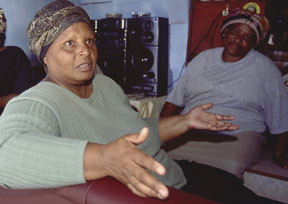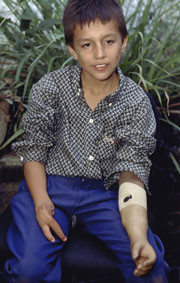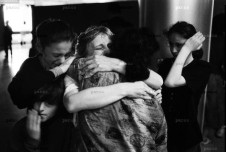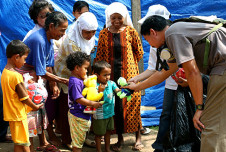In the summer of 2000, the International Committee of the Red Cross (ICRC) asked Harvard University researchers Nancy Briton and Jennifer Leaning to analyze some of the most comprehensive data ever collected about human suffering in war.
Over the previous year, the ICRC had conducted thousands of hours of interviews with residents of 12 of the most war-torn areas on earth. The interviews were part of its People on War project, an attempt to document the varied human experiences of war in order to build greater support for international humanitarian principles. From Afghanistan to Colombia, combatants, refugees, doctors, housewives, and many others discussed the impact war had made on their lives. Briton and Leaning found the interviews almost unbearably powerful.
 Interview subjects of the People on War project from South Africa.
© CICR/Fred Clarke
Interview subjects of the People on War project from South Africa.
© CICR/Fred Clarke
But they also found something else. Amid heart-wrenching accounts of humiliation and loss were unsolicited expressions of compassion and memories of altruistic acts. This surprised Briton and Leaning, particularly because interviewers for the People on War project didn’t ask about experiences of compassion. For the most part, says Briton, the interviewers asked the subjects “about terrible things that happened to them in war,” yet some subjects “spontaneously gave examples of people who had helped them.” There was the Abkhazian farmer who remembered how his Georgian neighbors had interceded on his behalf, even lying before tanks that approached his village; a Nigerian community leader who recalled how Nigerian and Biafran enemy combatants shared food at the war front.
After months of being immersed in stories of “unending woe,” says Leaning, these “little instances of resistance” stood out. By no means did Briton and Leaning think these cases negated the horrors of warfare, but they did see them as evidence that war doesn’t always wipe out moral consciousness.
“We’re dealing with populations that are enmeshed in a terribly ugly social setting for months or for years, ” says Leaning. “They’re ashamed of what they’re doing, but they’re still doing it.” When people can break free of this violence and degradation, she says, their behavior provides “an indication of what might be called up in greater number, in greater consistency, if we understood its origins.”
 A Colombian child interviewed by the People on War project.
© CICR/Fred Clarke
A Colombian child interviewed by the People on War project.
© CICR/Fred Clarke
After completing an initial analysis of the ICRC’s data, Briton and Leaning obtained funding for a new analysis from the Fetzer Institute, a private foundation that supports scientific research into positive behaviors and emotions like altruism, love, and forgiveness. They sorted by hand through hundreds of pages of interview transcriptions, looking for mentions of compassion or altruism.
Briton and Leaning believed that if their research could indicate why some people exhibit the better qualities of human nature, especially in brutal circumstances, perhaps it could help societies deliberately promote altruism and compassion in the future—during war and potentially in everyday life as well.
Briton and Leaning were not the first to examine such questions about altruistic and compassionate behavior; indeed, their project is the latest in a series of research on the topic. Perhaps the most notable work on the subject is Samuel and Pearl Oliner’s 1988 book The Altruistic Personality, a study of people who rescued Jews from the Nazis during the Holocaust.
Occasionally, Briton and Leaning’s report highlights similarly heroic deeds that meant the difference between life and death. But for the most part, their project has focused on the significance of everyday acts of altruism in the context of war, not necessarily the heroism of moral exemplars. To them, when one’s sense of morality is embedded in a world of hate and murder, some of the simplest acts—sharing a glass of water or temporary shelter with the enemy, for instance—take on extraordinary significance. These altruistic acts enable people on the giving and the receiving ends to reclaim their humanity and moral dignity at a time when both are usually obscured by the fog of war. Sometimes, even doing nothing—simply not committing violent acts—can be compassionate, according to Briton and Leaning, who call such (non)actions “compassionate restraint.”
What could motivate such acts? Briton and Leaning say it will take much more research on the topic before we know for sure. But they believe their research points to four main factors: feelings of self-efficacy, a desire for reciprocity, a sense of group affiliation, and a wish to reclaim one’s moral identity.
1) Self-efficacy. Examples of self-efficacy can take different forms. The report quotes a Palestinian ambulance driver who said that because of his profession, he would rescue a wounded Israeli soldier, even if that soldier had killed a relative of his. It also cites a Christian Lebanese journalist who used his press ID to rescue Muslims from danger. These stories echo a point made often in psychological literature: people are more likely to try to help someone if they think they’re capable of succeeding. A sense of personal usefulness can trigger altruistic impulses that might otherwise remain dormant.
According to Leaning, this is key to why the ICRC trains soldiers in the principles of international humanitarian law. She thinks it is extremely important that governments and nongovernmental organizations (NGOs) like the ICRC “drill into soldiers that there is a moral decision process that they are responsible for.” These tools of moral reasoning usually don’t come instinctively, she says. Instead, soldiers must be made to feel that ethical decision making is a part of their job, and they must receive thorough instruction in making these decisions—something most governments haven’t been proactive about, she says.
2) Reciprocity. Those combatants who performed altruistic acts often attributed their behavior to reciprocity—the idea being that they treated their enemies the same way they wanted to be treated in return. Briton admits that this idea might not sound too “touchy feely.” But she theorizes that combatants may have cited reciprocity as their motive as a “face-saving device”: rather than seeming soft, they could present themselves as tough-minded, pragmatic soldiers, even when their actions were motivated largely by compassion. Other interview subjects explained reciprocity not as a calculated means to be rewarded for positive behavior, but as a way to stop violence by treating others with the kindness they would want to experience themselves. For instance, an Afghani housewife remembered how her father spared the life of a man who had killed her brother, saying that revenge only causes more bloodshed; a tribal elder in Somalia said he would “treat civilians of my enemies just as I am treating my own civilians. I will be kind to them.”
3) Group affiliation. Subjects’ tendency to exhibit altruism toward members of their own group might not seem surprising. But, as Briton points out, “we’re all members of lots of different groups at any given time.” Some people, she and Leaning found, were able to find common ground with people they could have easily dismissed as enemies. They seemed capable of transcending the ethnic or political divisions usually imposed by war: a Somali man said he rejected tribalism, choosing instead to identify with “the party of peace maintenance”; a Bosnian journalist remembered how she could not hold hostilities against her Serbian neighbor because their children had grown up together.
Briton says she believes that the implications of this finding go far beyond the arena of war. “I think they extend to everyday behavior,” she said. “I think that if anyone can find that thread of similarity with another person, for whatever reason, they’re going to treat them as an in-group member rather than an out-group member. They’re little threads, but there are so many that are available to us.”
4) Reclaiming moral identity. Finally, there were some people, Briton and Leaning report, who simply seemed sick and tired of war and sought to regain their moral identity that war had eclipsed. The authors found this group especially inspiring. “It’s nice when people can reach back into their psyches, into their pasts, and believe that they are moral beings, and be happier with that than being violent,” said Briton. For instance, one Christian ex-combatant from Lebanon said she never forgot her core values, because she had come from a decent family. When she once encountered a Muslim at a checkpoint, she helped him escape rather than hand him over to certain execution. After a former military official in Cambodia had given a displaced woman half his ration bag of rice, he was struck by her claim that she had never met a “good soldier” like him. He said he never forgot this statement, and he started to understand the tragedy of what he and other combatants in Cambodia were perpetuating.
But how can people be consistently reminded of their moral identities when they are stuck in the moral vacuum of war? Briton and Leaning say they noticed that the People on War interviews actually served an important function to this end. This is an observation echoed by Gilbert Holleufer, a communication advisor with the ICRC who was instrumental in launching the People on War project and later worked with Briton and Leaning analyzing the data.
To Holleufer, one anecdote sums up the effect of the People on War project. In South Africa, the ICRC conducted an interview with about a dozen members of a paramilitary group—“really dangerous people, violent men,” he said. They trusted the Red Cross enough to do the interview, but kept their weapons at their sides. After a while, they opened up and discussed how they had been swept up in combat, how they had killed women and children. At the end of the discussion, the group’s leader approached the ICRC delegate, patted him on the back, and told him, “You know, the outside world considers us as wild animals. My hands are stained with blood. But your discussion here has given me back part of my dignity.”
This story resonates deeply with Jennifer Leaning. From reading the People on War interviews, and through her own previous work in war zones, she learned to recognize that “people in these places are grateful for contact with the outside world. It makes them feel like human beings.” She says she feels strongly that one of the greatest services the ICRC and other NGOs can provide is “the external eye of the moral observer.” The mere presence of these groups can remind people of their own humanity, spurring them to recapture their moral identity through acts of compassion and altruism. If people in warfare have lost touch with their own moral voice, she says, “perhaps they’ll have a shock of recognition when they see someone coming out of a Land Rover and holding a white flag.”
This is one of several hypotheses that Briton and Leaning want to test in a follow-up study. They said their work so far provides a solid platform from which to launch further investigations, but they stressed that they have yet to prove definite connections between any of these factors and altruistic behavior. They’re currently seeking more funding to revisit many of the questions spawned by the People on War project, but want to conduct interviews that ask subjects explicitly about altruistic or compassionate motivations. Down the line, they hope that some of their research will inform intervention efforts.
Though they have no illusions that such research can ever stop wars, they think it could at least make conflicts less ugly. The key, says Leaning, lies in finding ways to strengthen people’s “moral musculature” before they ever find themselves in the midst of conflict, an objective she thinks “should be part of a common educational agenda across the world.”
After undertaking this initial project, Nancy Briton says she is optimistic that such a goal can be achieved: “To know that there is just a little glimmer of humanity and of hope even in the most demoralizing, traumatic, horrible situations in the world—it really does give me a bit of hope for the future.”






Comments